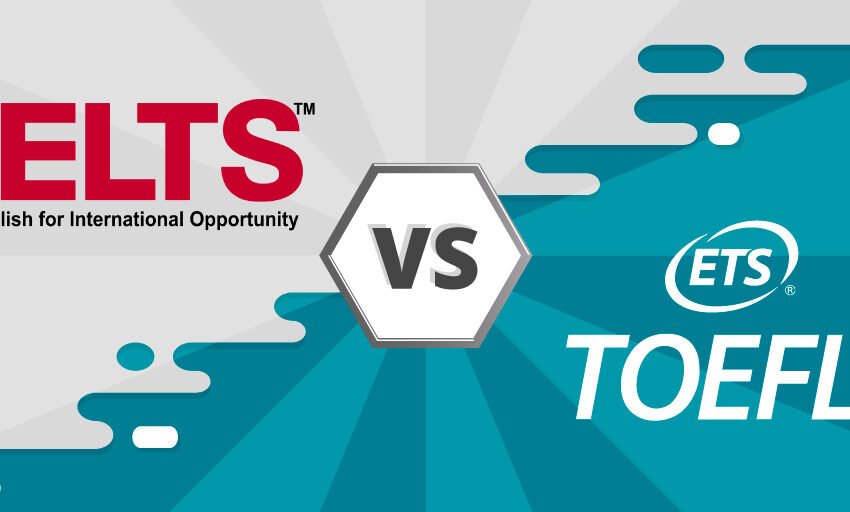Now! lets go Comparing IELTS and TOEFL, so you get the best understanding on how they work, and when/where they needed. When it comes to showing your English language proficiency for studying or working overseas, the option frequently boils down to two main exams: IELTS and TOEFL. Both are generally recognized by colleges, companies, and immigration agencies worldwide, although they differ greatly in format, scoring, and focus. If you find yourself questioning whether test is suitable for you, understanding the distinctions is crucial.
In this article, we will be comparing IELTS and TOEFL, highlighting their unique qualities, and helping you determine which test best meets your needs and ambitions. By comparing IELTS and TOEFL, you may make an informed choice that corresponds with your academic or professional ambitions.

IELTS: Without a Doubt, The Top Option For Test-Takers Globally
| IELTS | TOEFL | |
|---|---|---|
| Popularity (number of tests taken in 2018) | 3.5 million | 2.3 million |
| Test type | Paper-based and computer-based | Computer-based only |
| Accepted by Canada and UK immigration departments | Yes | No |
| Speaking test | With a real person who understands different accents | Talking to a computer |
Recognize the differences between IELTS and the TOEFL
With the TOEFL, you cannot immigrate to Canada or the UK.
The TOEFL is not recognized as a legitimate English language test for immigration by Canada or the UK. Furthermore, the TOEFL iBT, the longer version of the exam, is the only one accepted by the Australian immigration department.
IELTS is widely accepted!
IELTS is the recommended choice for anyone wishing to relocate overseas for study, employment, or immigration since it is widely recognized and acknowledged by prestigious universities, academic and professional associations, and the immigration authorities of Australia, Canada, the UK, and New Zealand.
IELTS provides greater adaptability.
While IELTS offers the option to administer the test on paper or on a computer in many locations, TOEFL is primarily administered by computer in most nations. This feature is very helpful for people who would like write their comments by hand rather than on a keyboard. Because of this, IELTS gives test-takers more flexibility and the ability to select the testing style that best meets their needs.
Get rid of the bots and converse with a human.
You will have to talk into a microphone in a room with other test-takers for the speaking portion of the TOEFL exam. IELTS, on the other hand, assesses your spoken English through in-person conversations with a qualified examiner who is knowledgeable about different dialects. You will have the opportunity to ask the examiner any questions you may have and receive clarification or more information during this private assessment.
Read Also: Best Universities For Software Engineering In Canada
Easy and uncomplicated scoring
IELTS scores are calculated using a simple system that rounds results to the closest 0.5. A score of 6.75 would therefore be rounded to 7.0. However, the TOEFL scores are determined through a complicated system of “raw” and “scaled” scores, which complicates the scoring procedure.
Even if one wants to study in Canada, IELTS is the clear option.
The English exam requirements for the Student Direct Stream (SDS) study visa have changed, according to recent announcements from Immigration, Refugees and Citizenship Canada (IRCC). The IELTS Academic test will no longer need test takers to receive a 6.0 on each particular skill as of August 10, 2023. Rather, they can only meet the SDS English proficiency criteria with an overall score of 6.0.
TOEFL iBT and TOEFL Essentials substitutes
For a number of reasons, IELTS English proficiency exams are a fantastic substitute for TOEFL iBT and TOEFL Essentials. First off, IELTS is widely recognized by colleges, companies, and immigration agencies across the globe in English-speaking nations. Second, whereas TOEFL focuses mostly on American English, IELTS evaluates both British and American English.
Thirdly, unlike the TOEFL’s speaking portion, which is recorded and assessed afterwards, IELTS offers a more customized speaking test in which the candidate speaks with an examiner. Last but not least, IELTS provides a paper-based test option that isn’t offered by TOEFL iBT or TOEFL Essentials. With these benefits, IELTS is a compelling substitute for the TOEFL for people looking to work, study, or relocate to an English-speaking nation.
Read Also: Study in Canada: Guides To Study In Canada for International Students
What are the primary variations in format between IELTS and TOEFL?
Comparing IELTS and TOEFL begins with understanding their formats. IELTS is broken into four sections: Listening, Reading, Writing, and Speaking. The test can be taken on paper or computer, and the Speaking test incorporates a face-to-face interview. TOEFL, however, is often taken on a computer and is similarly broken into four sections: Reading, Listening, Speaking, and Writing. In TOEFL, the Speaking section demands you to talk into a microphone, and your responses are recorded and later analyzed. While IELTS allows you to answer the questions in a more free fashion, TOEFL is more regimented, with all sections being computer-based.
How do IELTS and TOEFL differ in terms of scoring?
When comparing IELTS and TOEFL, the scoring methodologies are substantially different. IELTS scores range from 1 to 9 for each section, with an overall band score that is the average of the four sections. TOEFL grades each section on a scale from 0 to 30, with a total score ranging from 0 to 120. IELTS uses whole and half bands (e.g., 6.5, 7.0), while TOEFL uses a point system. Whichever scoring system is easier for you to comprehend or better fits the requirements of the colleges you are targeting may determine which one you ultimately choose.
Which exam is more commonly accepted by academic institutions?
Comparing IELTS and TOEFL acceptance, both exams have broad international recognition. ToEFL is more often accepted in the US and Canada, although IELTS is frequently chosen by universities in the UK, Australia, and New Zealand. Even while the majority of universities accept both exams, it’s still important to confirm the particular requirements of the colleges or organizations you’re applying to. Understanding which test is more popular in a certain nation will help you make a more calculated decision if that nation is your goal.

What subjects are tested differently on the TOEFL and IELTS?
Comparing IELTS and TOEFL, IELTS often covers a wider variety of text kinds and accents. While TOEFL typically uses North American English, the Listening component of the IELTS may include British, Australian, and American accents. While the TOEFL focuses primarily on academic texts, the Reading component of the IELTS covers a wider range of text types, including periodicals and newspapers.
While the TOEFL speaking component is more academic and demands you to incorporate material from reading and listening sections into your responses, the IELTS speaking section more conversational. The exam you find most comfortable may differ from the other depending on how well-versed you are in various English accents and writing formats.
Which exam is simpler to get ready for?
It relies on your skills and limitations to compare the preparation requirements for the TOEFL and IELTS. IELTS is frequently seen as being simpler for people who are more at ease in person because the Speaking portion include a live interviewer. For people who are more accustomed to using technology and would rather take a computer-based exam, the TOEFL could be simpler. While TOEFL is mostly focused on multiple-choice questions, IELTS offers a greater variety of question kinds. IELTS might be a better choice if you want a more diverse test experience, and TOEFL might be a better fit if you enjoy standardized forms.
Recommended
- Top 8 Institutions Offering Pharmacology Courses In Australia
- How to Get into MIT from India: Admission Requirements
- Top Community Colleges in Canada for International Students
- Study in Canada: Guides To Study In Canada for International Students
What are the differences between TOEFL and IELTS time management?
Comparing IELTS and TOEFL, the IELTS exam normally lasts two hours and forty-five minutes, with separate timings for each section. The TOEFL iBT exam lasts for approximately three hours, with a ten-minute intermission in between the speaking and listening portions. Time management on the IELTS can be more flexible, particularly during the Speaking section when you speak with an examiner face-to-face.
Because TOEFL is totally computer-based, there are specific time limitations for each task that must be followed. IELTS might be a better option if you want a more hands-on, low-tech experience; on the other hand, TOEFL might be a better fit if you feel more at ease in a timed, structured setting.
To sum up, it’s critical to compare the TOEFL and IELTS in order to choose the best test for your level of English proficiency. The best test to take will depend on your academic objectives, personal preferences, and the requirements of the colleges you are applying to. Each test has advantages and disadvantages of its own. Whether you go with the conversational and flexible approach of IELTS or the rigid format and academic focus of TOEFL, both exams have the potential to lead to international opportunities.
SEE ALSO:
Trust you found our article on IELTS vs TOEFL: comparing IELTS and TOEFL helpful. Follow our website for more interesting articles.

